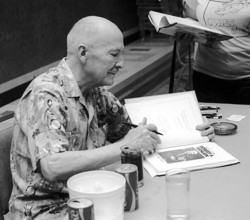Dissertationproject of Jonas Nerke
Rereading Robert A. Heinlein (working title)
The mid-twentieth century saw the end of the Second World War, setting in motion the assembly of the United Nations as a global project for peace. It heralded a Keynesian economy, which distributed property more evenly to give rise to otherwise unthinkable enterprises, that in turn created prosperity for all. It was a conduit for the civil rights movement, despite the allegedly ‘natural’ limits forced onto racialized groups. It was a great reminder for humankind’s potential, visible in the inception of atomic science, which paved the way for a radically new type of energy production or its self-annihilation as a species. Seeing history play out in this trajectory became just as much a vital inspiration for the science fiction genre as sci-fi already was a spark to the people making said history. In present day’s cynical climate, where nuclear power could not yet satisfyingly solve the problem of green energy, of massive recessions leaving the vacuum for monopolization, increasing racialized violence and renewed military conflicts around the world, many authors of these stories seem downright naive. Nonetheless, there have been exceptions to this techno-optimism back then, long before the trends of dystopian SF or cyberpunk, and a particularly prominent one is Robert Anson Heinlein.
My dissertation project recontextualizes Heinlein’s lifework, not as a catalog of fiction, which should be paid respects to for its decaying contributions to the sci-fi genre, but an autopoietic authorship system, which is kept active and alive by his inheritors at the Heinlein Society managing the intellectual properties, agents in the publishing industry commissioning reprints and translations or of other media buying the rights to adaptions, as well as different authors referencing him, readers recommending his work to their friends and individuals like me making it a subject of academic inquiry. By treating Heinlein’s science fiction as such, other systems interpenetrating it are made overt and when examining these relations more closely, one can fathom the full extent to which this authorship is still relevant and might stay like this for the unforeseeable future. It is often mentioned that Starship Troopers ended up on the recommended reading list for several branches of the United States Armed Forces and that Heinlein’s ‘juveniles,’ his YA stories, were published as instructive material in Boy Scout magazines. Although venerated by these institutions, Heinlein’s writing always had a bittersweet relationship with them, stemming from the deeply antiauthoritarian sentiment within it.
By employing a unique tendency of systems theoretic approaches informed by process philosophy, the dissertation seeks to answer the question of how Robert A. Heinlein’s sci-fi is structurally coupled with the current sciences, economy, politics, moralizing communication, religion and art. Prehensions of note here are Heinlein’s plea for instrumentalism, freed markets, a realpolitik of self-determination, the amoralization of gender identities as well as romantic and sexual preferences, mysticism and a Dionysian culture, juxtaposed by his criticisms of scientism, accumulative property rights, ideal-based centralization, normativity, dogmatism and Apollonian culture. Investigating this oeuvre systemically does not only illustrate interactions with its cultural environment, which are not yet researched. It traces a literary map, painstakingly created over half a century by a man of the past, to show us today’s routes to our possible futures.
Short biogaphy
Jonas Nerke received a Bachelor of Arts degree in 2017 as part of a teacher education program for vocational schools at the University of Cologne. The program covered English language and literary studies as well as special needs education training for students with mental disorders. After that he continued his studies in Cologne and specialized his efforts to achieve a Master of Arts degree in English studies in 2021. Since 2022 he is conferring a doctorate in English philology in form of a collegiate position at the a.r.t.e.s. Graduate School for the Humanities Cologne under the supervision of Prof. Dr. Hanjo Berressem.
Contact: jonas.nerke(at)gmail.com
Activity
- Inclusionary assistant for children with diverse learning disabilities at schools in Cologne for the wir für pänz registered association from 2018 to 2021
- Activism in the Kurdish liberation movement and cocreation of the Initiative Democratic Confederalism between 2019 and 2020
- Activism within the Political Theological Action Group Cologne since 2019
- “Nietzschean Influences in Robert A. Heinlein’s Work.” 23-25 September 2021
- Speculative Fiction and Ethics, annual conference of the Gesellschaft für Fantastikforschung registered association. Fundraising for Operation Solidarity since 2022

